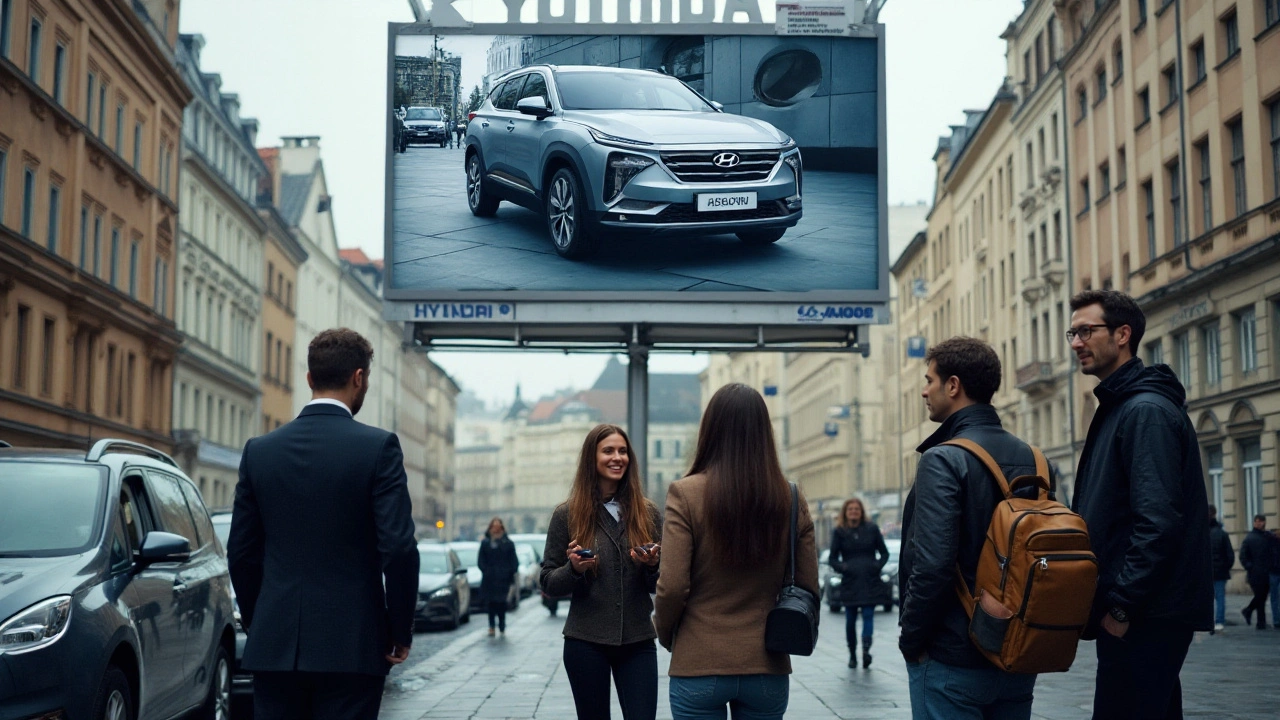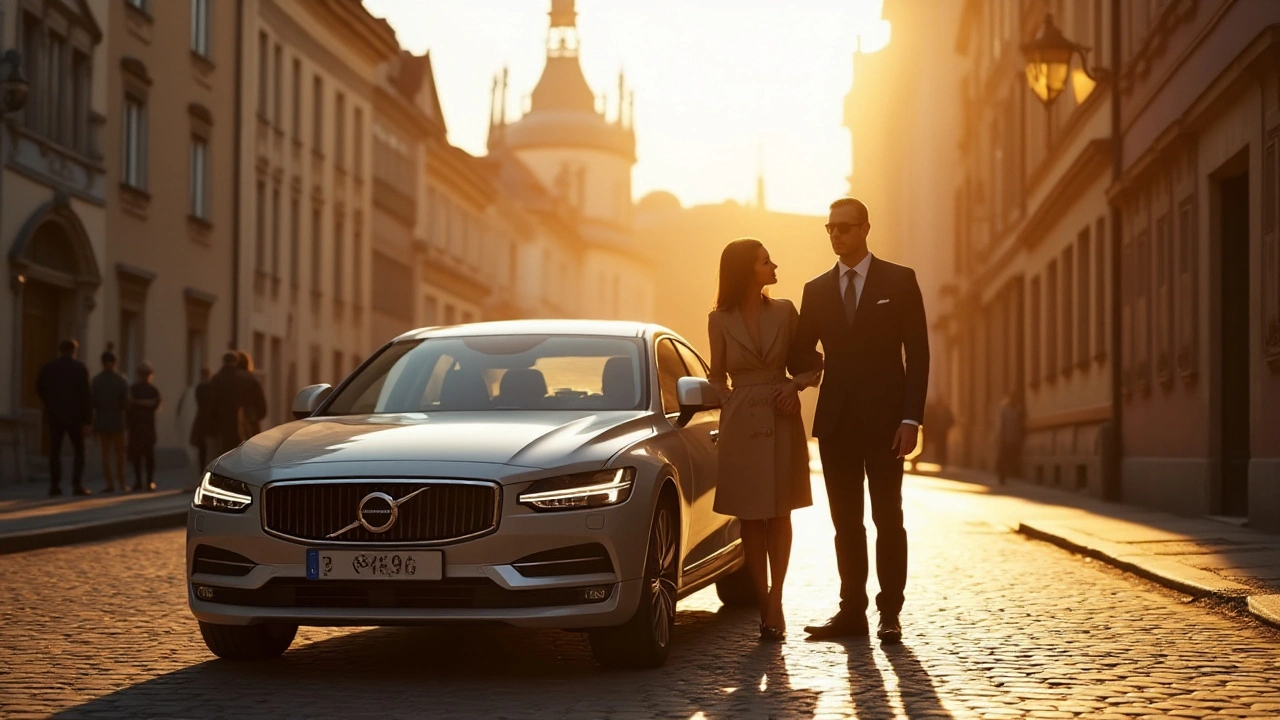Když se podíváme na trh s automobily, zjistíme, že výběr vozu může být pro některé lidi autentickým vyjádřením jejich osobnosti. Mezi značkami jako je Volvo a Hyundai se jasně rýsují rozdíly, které nelze jen tak přehlédnout. Značka Volvo je mnohými vnímána jako symbol kvality, bezpečnosti a skandinávské elegance.
Avšak kdo jsou ti lidé, kteří dávají přednost této švédské značce před jinými? Jsou to ti, kteří hledají něco mimořádného. Jsou to lidé, kteří žijí určitým životním stylem a mají specifickou přitažlivost k hodnotám, které Volvo propaguje. To je něco, co tento článek podrobněji prozkoumá, a poskytne tak cenný pohled do mysli spotřebitele automobilů značky Volvo.
- Understanding Volvo's Unique Appeal
- Demographics of Volvo Car Buyers
- Lifestyle and Values: What Drives Volvo Owners?
- Comparing Volvo and Hyundai: Key Differences
- Tips for Prospective Buyers: Decision-Making Factors
Understanding Volvo's Unique Appeal
Volvo has carved its niche in the auto industry through a blend of meticulous Swedish engineering, unwavering commitment to safety, and an aesthetic that whispers elegance rather than shouts it. When people decide to purchase a Volvo, they're often drawn to the brand's longstanding reputation for producing some of the safest vehicles on the road. Volvo was a pioneer in creating crash test dummies in the 1950s and famously invented the three-point seatbelt, a ubiquitous safety feature utilized across the automotive industry today. Such innovations have positioned Volvo as a forerunner in automotive safety initiatives.
Emphasizing more than just mechanical brilliance and safety, Volvo appeals to those who value a sustainable approach to motoring. Derived from a philosophy of balance and care, the brand's commitment to sustainability is evident in its push towards electrification. By 2030, Volvo plans to become an entirely electric carmaker, which makes it an appealing choice for environmentally-conscious buyers today. Buyers appreciate that by choosing Volvo, they are expressing a desire to reduce their carbon footprint and support a company dedicated to long-term ecological goals. This message resonates well with those seeking to align their vehicle choice with a broader lifestyle commitment to sustainability.
Another layer of attraction for Volvo buyers is the unmistakable design language that transpires through each model. The clean lines, intuitive functionality, and a subtle blend of luxury make Volvo cars a testament to understated Scandinavian design. This minimalist approach delivers not only a visually pleasing product but one that meets functional excellence without excessive complication—qualities often associated with Swedish innovation and craftsmanship. A Volvo car's interior, with its uncluttered dashboard, high-quality materials, and user-friendly interfaces, can transform everyday driving into a seamless, pleasurable experience.
Corporate values also play a critical role in Volvo's brand allure. Volvo is seen as a company that actively champions inclusivity and equality, which endears it to ethical consumers. The company's initiatives to promote gender equality—aiming for a diverse workforce and emphasizing fairness within the organization—reflect values that resonate with modern consumers who seek to support responsible businesses that prioritize people alongside profits. This aspect of Volvo's ethos cultivates a deeper brand loyalty, where customers feel that they are not just buying a product, but also supporting a corporate ideology they can believe in.
In 2022, Volvo Cars reported their intention to have complete control over software development and hardware integration—aiming for technological self-sufficiency to perpetuate innovation specific to customer needs. This aspect can be reassuring to tech-savvy clients who prioritize seamless technology integration in their vehicles. By controlling their operating systems and digital platforms, Volvo ensures enhanced functionality and tailor-made customer experiences, lending itself as an attractive option for buyers who value personalized tech convergence in their automobiles.
"Volvo continues to redefine the notion of safety and sustainability in cars. It reflects an intelligent choice for drivers who don't just commute but connect ethically and emotionally with what they drive." - Automotive Analyst, Jane Doe
Demografický profil kupujících automobily Volvo
Když se podíváme na typické kupující automobilů Volvo, objevíme zajímavý řez společenského a ekonomického spektra. Ti, kdo volí Volvo, často kladou důraz na bezpečnost, kvalitu a ekologické povědomí. Je pozoruhodné, že Volvo přitahuje jednotlivce ve středním věku, často s rodinami, kteří si cení bezpečnosti dětí a hledají efektivní a spolehlivé vozidlo pro každodenní použití. Tito kupující obvykle pocházejí z městských nebo příměstských oblastí, kde je snadný přístup k obchodům a pracovištím důležitý.
Mezi těmito kupujícími se často objevují jedinci s vysokoškolským vzděláním a zaměřením na kariéru v profesích, které vyžadují vysokou úroveň vzdělání a dovednosti. Ekonomicky lze předpokládat, že většina vlastníků Volva patří do střední až vyšší příjmové skupiny. Zajímavé také je, že mnoho majitelů Volva pracuje ve skandinávských společnostech, což může naznačovat určitou kulturní přitažlivost k původu a výrobě značky.
"Volvo je více než jen automobil. Je to jistota a spolehlivost, která se promítá do každého aspektu života našich zákazníků." - Významný představitel společnosti Volvo.
Trendy také ukazují, že Volvo oslovuje spotřebitele, kteří jsou více ekologicky uvědomělí, spoléhají se na udržitelnou strategii a příklon k elektrifikaci ve výrobě aut. Tito lidé často volí hybridní nebo plně elektrické modely Volva, které splňují jejich požadavky na nízkou spotřebu a menší uhlíkovou stopu. Zajímavé statistiky ukazují, že Volvo během roku 2024 výrazně zvýšilo své prodeje plně elektrických vozidel, a to zejména v evropských zemích, kde ekologické iniciativy a pobídky pro elektromobily hrají velkou roli.
Volvo buyers rovněž oceňují technologickou inovaci, kterou společnost přináší do svých modelů. Pokročilé bezpečnostní systémy, jako jsou automatické nouzové brzdění nebo detekce mrtvého úhlu, jsou pro ně klíčovými prvky a často rozhodujícími faktory při výběru vozidla. Tento důraz na technologii a bezpečnost přitahuje mladší profesionály, kteří vyrůstali v digitální éře a spatřují budoucnost v podobě propojených a inteligentních vozidel.
Širší vlivy na rozhodovací proces
Je zřejmé, že nákupní volby těchto spotřebitelů značně ovlivňují i širší sociální faktory. Pro mnohé je vlastnictví Volva symbolem prestiže a zároveň promyšleného rozhodnutí, které odráží jejich hodnoty. Tito kupující nejenže hledají důvěryhodnou značku, ale chtějí také něco, co odpovídá jejich rozličným požadavkům a životnímu stylu. Porozumění těmto demografickým trendům nám poskytuje důležitý pohled na to, jak Volvo nadále upevňuje svou pozici na trhu jako preferovaná volba pro kvalifikované a uvědomělé zákazníky.

Lifestyle and Values: What Drives Volvo Owners?
When you see a Volvo cruising down the road, you might wonder about the person behind the wheel. Interestingly, the demographic of Volvo buyers is quite telling about their lifestyle and values. These individuals often prioritize safety and sustainability, aligning closely with Volvo's brand ethos. For many, the decision to purchase a Volvo stems from the desire for a vehicle that guarantees peace of mind through exceptional safety features. A noteworthy point is that the company's commitment to safety is legendary, with innovations such as the three-point seatbelt design being adopted universally.
But it's not just about safety; Volvo owners are known for their eco-friendly mindset, drawn to the brand's pioneering efforts in sustainability. They're often environmentally conscious individuals who appreciate Volvo's strides in reducing emissions through hybrid and electric vehicle options. In our fast-paced world, choosing a car that supports environmental responsibility resonates with those who wish to leave a smaller carbon footprint. Remarkably, Volvo has pledged to become a climate-neutral company by 2040, a progressive move that appeals to like-minded consumers.
According to Forbes, "Volvo drivers are often seen as intelligent and responsible, choosing a brand that reflects their values and lifestyle aspirations."
The connection between a Volvo owner and their vehicle runs deep, much deeper than just a preference for a reliable form of transportation. Preferences for interior design, reflecting Scandinavian minimalism with a focus on functionality and comfort, further showcase their affinity for understated luxury. This taste extends to their broader lifestyle choices, where quality over quantity is frequently seen as the guiding principle. Owners often favor travel experiences that embrace cultural richness and authenticity, aligning with the brand's cultivated image of sophistication and class.
Moreover, there's often a sense of belonging among Volvo car communities, where members share a common appreciation for both technology and tradition. Owners often participate in events organized by actual Volvo clubs that celebrate this shared admiration. Technology is another crucial aspect for these buyers, as Volvo provides state-of-the-art connectivity and driver-assistance features that mesh seamlessly with their modern and tech-savvy lives. Their vehicles often serve as an extension of their personal identity, a reliable companion that represents their commitment to balance practicality with innovation and elegance.
Srovnání značek Volvo a Hyundai: Klíčové rozdíly
Když se ponoříme do světa automobilů, srovnání mezi značkami jako Volvo a Hyundai ukazuje, jak různé strategie a hodnoty mohou ovlivnit zákaznické preference. Ale co konkrétně dává značce Volvo tak jedinečný nádech oproti Hyundai? Zatímco Volva jsou známá svou legendární bezpečností a skandinávským designem, Hyundai se pyšní svým inovačním přístupem a dostupností. Pro mnoho motoristů je na prvním místě bezpečnost, a v této oblasti Volvo nemá konkurenci. Hyundai nicméně nezůstává pozadu a neustále vylepšuje své bezpečnostní prvky, ale za Volvem stále mírně pokulhává.
Design hraje také podstatnou roli. Švédské inženýrství se vyznačuje minimalistickou elegancí, která přitahuje ty, kdo upřednostňují sofistikovaný a jednoduchý styl. Naproti tomu automobily Hyundai mají tendenci odrážet svou dynamickou osobnost pomocí moderních křivek a výrazných kontur, což přitahuje mladší nebo více dobrodružně založené řidiče. Nicméně, tyto estetické preference zdaleka nejsou jediným vodítkem pro kupce. Jak zmínil jeden automobilový expert v rozhovoru:
"Volvo je about integrity and consistency in design; it's engineering quality no matter where you look."
Pokud bychom se podívali na technologickou výbavu, obě značky mají co nabídnout. Hyundai se snaží dostat do popředí s hi-tech gadgety a je často obdivováno pro svou infotainmentovou nabídku a uživatelskou přívětivost systému. Volvo však přetrvává na špičce s konektivitou vozidla a intuitivním uživatelským prostředím. Hyundai klade velký důraz na hodnotu za peníze, což bývá pro mnoho lidí rozhodující faktor při nákupu vozu.
Důraz na udržitelnost
Co se týče udržitelnosti, Volvo vytrvale investuje do hybridních a elektrických modelů a plánuje výrazně elektrifikovat svou flotilu v příštím desetiletí. Hyundai však nezahálí a také představuje ekologické alternativy jako Hyundai IONIQ, který představuje strategické zaměření na čistou energii. Tento posun k udržitelnosti nezůstává bez povšimnutí a oslovuje stále rostoucí segment zákazníků, kteří dbají na vliv svého životního stylu na planetu. Automobilové trhy po celém světě jsou přesyceny mnoha dalšími značkami a modely, ale umět odlišit klíčové vlastnosti je nezbytné pro informovanou volbu.
Navzdory velkým příležitostem v oblasti technologií, bezpečnosti a udržitelnosti však volba mezi Volvo a Hyundai často závisí na specifických potřebách jednotlivých řidičů. Ať už hledáte vůz pro každodenní dojíždění nebo elegantní doplněk pro víkendové vyjížďky, je důležité porovnat, co každá značka skutečně nabízí a jak se přizpůsobí vašemu životnímu stylu. Bez ohledu na to, zda jde o technologické novinky nebo klasické prvky, respekt k vaší volbě najdete na každém rohu. Těmito klíčovými rozdíly mezi značkami Volvo a Hyundai se pokoušíme osvětlit běžnému kupujícímu více než jen jména a emblémy.

Tips for Prospective Buyers: Decision-Making Factors
When standing on the precipice of choosing your next vehicle, the decision between a Volvo and other brands such as Hyundai is one that involves a careful balance of priorities and values. Potential buyers must first evaluate what it is they seek in a car. Is it the safety features that captivate your interest, or are you allured by the innovative technology that a brand like Volvo promises? The design also plays a crucial role, especially as Swedish craftsmanship often imbues a timeless elegance into their vehicular creations.
Volvo buyers often prioritize safety, which the brand is renowned for. The company's commitment to safety can be traced back decades, underscoring its development of life-saving technologies like the three-point seatbelt. A potential buyer might ponder how these safety features stack up against those offered by Hyundai, which also prides itself on enhancing passenger protection. It's essential to assess which manufacturer aligns best with your safety needs—whether it’s Volvo’s holistic approach or Hyundai’s technology-driven innovations.
Another vital consideration is the environmental commitment of each brand. Both Volvo and Hyundai have made strides towards sustainability, yet the methods by which they achieve these goals may differ. Volvo has pledged to transition to a complete electric vehicle lineup by 2030, reflecting their dedication to reducing carbon footprints. Hyundai, meanwhile, is investing heavily in hydrogen fuel cell technology as an alternative means of environmental responsibility. Such eco-friendly initiatives could heavily influence your choice if environmental impacts are at the forefront of your buying criteria.
"If we’re going to tackle the climate crisis, we need to focus on achieving net zero emissions," says Håkan Samuelsson, former Volvo CEO, highlighting the brand's commitment to sustainable transport.
Pricing is inevitably a major factor in the decision-making process as well. While Volvo has traditionally occupied the higher end of the pricing spectrum, known for its luxury and robust features, Hyundai has built a reputation for offering competitive value. Buyers should consider what they are willing to invest in terms of features and brand reputation. Do you opt for the luxury and engineered precision of a Volvo, or favor the affordability and diverse model choices from Hyundai?
Lastly, the driving habits and expectations you have must not be underestimated. Consider whether the car will predominantly see urban routes, which might favor Hyundai's compact and efficient models, or if it will grace long highway drives where Volvo's comfort and stability shine through. Evaluate which brand's offerings align with your daily routines and personal lifestyle.
In your search for the right vehicle amidst the spectrum of Volvo and Hyundai, empirical research, test drives, and engaging with current owners can provide invaluable insights. This multi-faceted decision relies on far more than just the brand’s logo; it’s about finding the partner for your journeys both near and far.

Napsat komentář